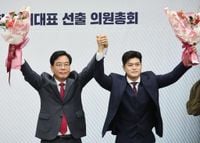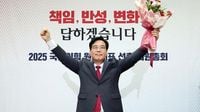On June 16, 2025, the People Power Party (PPP) elected Song Eon-seok, a three-term lawmaker from Gyeongbuk Gimcheon in the Daegu-Gyeongbuk (TK) region, as its new floor leader. Securing 60 votes out of 106 in the National Assembly, Song won by a clear majority in the first round, defeating his rivals Kim Seong-won and Lee Heon-seung, who received 30 and 16 votes respectively. This election consolidates the influence of the so-called 'pro-Yoon Seok-yeol faction' within the party, continuing the leadership style of his predecessor, Kweon Seong-dong.
Song Eon-seok’s victory comes at a critical juncture for the PPP, which is grappling with the aftermath of a recent presidential election defeat and internal party divisions. As the leader of the largest opposition party holding 107 seats, Song faces the daunting task of countering the ruling party’s legislative agenda while preparing the party for an early convention to elect new leadership. His first public remarks as floor leader underscored the urgent need for party reform and unity.
In his policy speech prior to the vote, Song proposed the swift convening of a party convention and the establishment of an innovation committee to drive change and renewal within the party. He emphasized, “We are an opposition party that has lost power and is a minority in the National Assembly. Change and reform are necessary. Moving backward is a grave mistake. We must look to the future and focus on the people.” This call for transformation reflects the pressing demand among PPP members to rebuild and reposition the party after its electoral setbacks.
Song’s background as a seasoned economic bureaucrat and policy expert is seen as a key asset in his new role. After graduating from Gyeongbuk High School and Seoul National University Law School, Song passed the 29th administrative examination and embarked on a distinguished public service career. He held senior positions at the Ministry of Strategy and Finance, including Budget Director and Second Vice Minister, before entering politics through a 2018 by-election in Gimcheon. Since then, he has been re-elected twice, securing his third term in the National Assembly. Currently, he chairs the Planning and Finance Committee, earning a reputation as one of the party’s leading economic experts.
Despite these credentials, Song’s election has not been without controversy. While he is generally regarded as relatively non-factional, he is classified as part of the broader 'pro-Yoon' camp, which remains influential within the PPP. His ties to this faction were evident during the tenure of former President Yoon Seok-yeol, including participation in rallies opposing Yoon’s impeachment and protests against the execution of an arrest warrant for Yoon in early 2025.
Within the party, some voices express concern that Song’s leadership may stall genuine reform. A senior PPP official remarked, “Many of our lawmakers seem more interested in maintaining power through loyalty to the pro-Yoon sentiment rather than innovating conservative values or pursuing real reform. This raises worries about the party’s future.” Additionally, Song’s past conduct has been scrutinized; during the 2021 by-elections, he was involved in an incident where he verbally and physically abused a party staff member, an episode that still lingers in public memory and complicates his image as a reformer.
Song’s role as floor leader places him at the forefront of negotiations with the ruling party, which holds a majority in the National Assembly. Immediate challenges include personnel hearings for new government officials, negotiations over supplementary budgets, and the allocation of key committee chairmanships, notably the Legislation and Judiciary Committee, currently held by the opposition. Song has advocated for restoring parliamentary norms, suggesting that the ruling party should concede the judiciary committee chairmanship to the opposition as part of reestablishing cooperative legislative politics.
Moreover, Song faces the internal challenge of healing party divisions after the presidential defeat. He proposed forming an innovation committee free from overt factional bias, stating that individuals perceived as aligned with particular factions should consider stepping back from this process. This initiative aims to foster unity and propel the PPP toward a renewed identity focused on policy and governance rather than factionalism.
Song’s election also signals the continued dominance of the pro-Yoon faction within the party, which holds sway over approximately 60 lawmakers. The consolidation of support from the TK region and the broader Yeongnam area, traditional strongholds for the PPP, was instrumental in his victory. Analysts note that this regional and factional support likely played a decisive role in the election outcome.
Reactions from within the party have been mixed. Yang Hyang-ja, a former co-chair of the interim leadership committee, criticized the election as a setback, calling it an “anti-innovation, anti-reform election” that risks turning the PPP into a “Gyeongsang-do party” mired in factionalism and regressive politics. Conversely, some party insiders argue that Song’s extensive experience in legislative negotiations, including his tenure as chief deputy floor leader under previous leaderships, equips him well for the complex task of steering the opposition in a hostile parliamentary environment.
Song himself has sought to distance his leadership from factional labels. At a press conference announcing his candidacy, he stated, “I am neither pro-Yoon nor pro-Han. The party’s future lies in transcending factions and regionalism.” His ambition is to transform the PPP into a policy-oriented party with strengths in economic and social welfare issues, leveraging his bureaucratic expertise to lead meaningful change.
As the PPP embarks on this new chapter under Song Eon-seok’s leadership, the party’s ability to reconcile internal divisions, mount effective opposition to the ruling government, and present a coherent vision to the electorate will be tested. With the stakes high and the political landscape shifting, Song’s tenure as floor leader will be closely watched as a barometer of the party’s resilience and adaptability.


